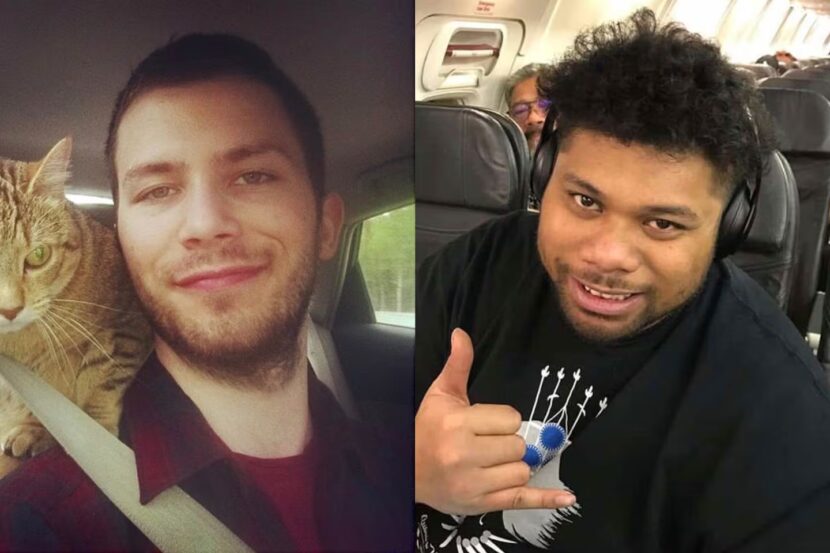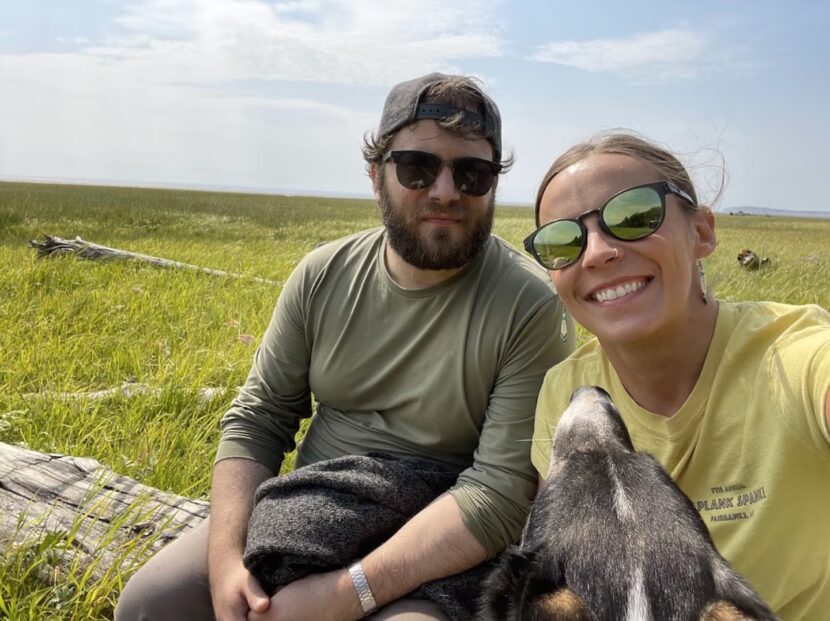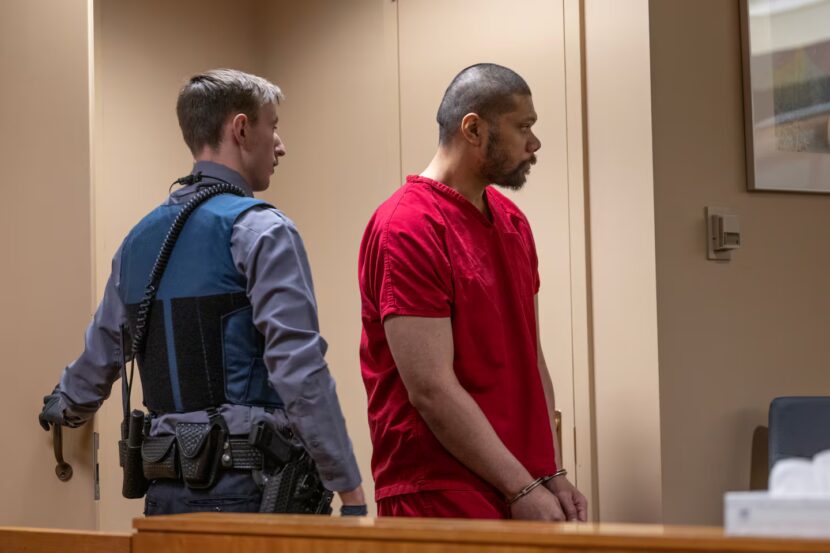
The lives of William Farmer and Lawrence Fenumiai ran parallel before merging with deadly consequences at the Anchorage jail in December.
Both men were diagnosed with schizophrenia in their 20s, their relatives say. Both families struggled to find help.
And both Farmer and Fenumiai ended up in Alaska’s correctional system, where people with mental illness make up nearly a quarter of the in-custody population but can’t always get the therapeutic support they need.
On Dec. 17, less than 24 hours after the men began sharing a cell, Alaska State Troopers say Fenumiai fatally beat Farmer, who died in early January.
Now Fenumiai faces first-degree murder charges as both families question the way the Alaska Department of Corrections handled the challenge of housing two people with diagnosed mental health disorders in a crowded jail cell.
Why were Farmer and Fenumiai placed in the same cell to begin with? Why was that cell in a transitional intake area rather than the jail’s designated mental health unit? And why was Fenumiai still there after a judge dismissed the case against him a week earlier?
Farmer’s twin sister, Robin, said her brother had been struggling with mental turmoil and hallucinations and couldn’t always make choices that were in his own best interests.
“I remember thinking, ‘Well, at least he’s safe,’” she said of his arrest in December. “That’s not true. You’re not safe in jail either.”
‘They set him up for failure’
The Department of Corrections is conducting an internal investigation that is ongoing, state officials said this week. Such investigations are standard for any death connected to a DOC facility.
“We want folks to come into our system and leave our system better, and to have a negative outcome like that, it bothers all of us,” said Adam Rutherford, the department’s deputy director for health and rehabilitation services. “None of us want to see that type of event occur.”
Farmer was 36 when he died. He came from an Anchorage family with deep Alaska roots that included a few generations of bush pilots and ownership of a Mat-Su lodge.
Police said Farmer had just entered the jail after a string of robberies at several Midtown businesses in late November and early December.
He was placed in a cell with two other men. Instead of a bunk, he was provided a plastic “boat” on the floor in a cell designed to hold two people.
Fenumiai, a 33-year-old former football standout at Juneau-Douglas High School, was already in the cell when Farmer arrived. He was awaiting release after a judge found him incompetent to stand trial.
Fenumiai had entered the correctional system in May when he was arrested in Juneau after an outburst at his family’s home. He hit his father in the head, destroyed his iPhone and damaged a cabinet, according to a police report summary included with a criminal complaint.
Fenumiai’s mother, Simeona Galletes-Fenumiai, said she doesn’t understand why their son was in a shared cell when he was held alone in Juneau over concerns he could hurt himself or others.
“They set him up for failure,” Galletes-Fenumiai said.
She said she prayed for Farmer’s recovery in the days before he died.
An ill-equipped provider
The fatal beating is the latest example of the struggle within Alaska’s criminal justice system to address the needs of people contending with mental illness in some form.
The state’s only psychiatric hospital, Alaska Psychiatric Institute in Anchorage, has come under fire for years for a lack of beds that keeps mentally ill defendants waiting in jail for evaluations or facing monthslong wait lists for treatment.
The state’s overall lack of mental-health treatment capacity bleeds into the correctional system, officials say.
About 22% of people in the state’s jails and prisons “suffer from a severe and persistent mental illness,” according to Rutherford, the deputy state corrections director.

Corrections officials would rather see many of those people treated by professionals in the community, rather than behind bars in an environment not designed to be therapeutic, he said.
“We’re the largest behavioral health provider in the state, and we shouldn’t be, and we don’t want to be,” Rutherford said.
When December’s encounter occurred, Farmer and Fenumiai shared a two-person cell with a third man on an intake area known as Alpha mod. The unit includes 16 double-occupancy cells on the east side of the Anchorage Correctional Complex.
Alpha mod is considered a “specialty management” open population housing unit, according to Department of Corrections spokesperson Betsy Holley. The area houses people with mental health or addiction issues that may set them apart from the general population.
It’s designed for people who may need more support or observation when they enter custody, according to Holley.
Nursing staff visit that part of Alpha mod at least three times a day, corrections officials said. Mental health staff visit at least once a day.
The mod is not, however, part of the jail’s designated mental health unit.
Perpetual purgatory
Robin Farmer said her brother was a bright person fascinated by aviation and the kind of animal lover who adopted senior dogs at the shelter even though he knew they might not live long.

His personality started to change when they were in their 20s, she said.
William Farmer found their mother dead when he and his sister were both seniors in high school, Robin Farmer said.
It was a week before final exams, a pivotal time in both their lives. She now wonders if the trauma of that time served as some kind of trigger for the mental illness that was coming.
The family noticed that William’s community was shrinking as it became harder for him to stay engaged, she said.
“These symptoms and hallucinations, over time, kept increasing more and more and more,” Farmer said. “That kind of ended up leading to him being in and out jail, in and out of API, on and off medication.”
The family struggled to find treatment, but occasionally found success, she said. During one period in custody, her brother spent three months at API and was moved into transitional housing.
“That was something that was really great: to see him get healthier, get happier and just get more back to himself,” Robin Farmer said.
Several years later, by December, he was back in jail on robbery, theft and assault charges. Police said he stole merchandise from three stores and used or brandished pepper spray before fleeing.
Less than 60 seconds

The jail cell assault happened very quickly, according to official accounts.
The third man in the cell said Farmer was lying on the floor, talking to himself with phrases like “shut up” followed by an anti-gay slur, when Fenumiai came off his top bunk, according to a sworn affidavit filed with murder charges by the Alaska State Troopers.
The other cellmate told investigators Fenumiai told Farmer to “shut the f— up” before he started punching him in the head, according to the affidavit. The smaller man was unconscious in under a minute, troopers wrote.
Corrections officers couldn’t safely get into the cell to intervene right away, the affidavit said. When they did, Farmer was limp on the floor.
He was rushed to Providence Alaska Medical Center for treatment of a traumatic brain injury.
The family didn’t get to see Farmer until more than 24 hours after the assault, his sister said. His eyes were blackened, his face was swollen, and he was breathing with help from a ventilator.
His feet were handcuffed to the bed even though he was unconscious, she said.
Christmas week passed with no change in his status. The hospital classified Farmer’s condition as critical.
Robin Farmer said the family made the decision to take her brother off the ventilator on Friday, Jan. 3. William Farmer wanted to be an organ donor but too much time lapsed between the ventilator’s removal and when his heart stopped beating, his sister said.
He didn’t die for another three days, nearly three weeks after the attack.
“We had to go through the trauma of experiencing the fact that somebody did this to him and killed him but we also had to go through the weight and heaviness of having to choose to let a family member go,” Robin Farmer said. “Both of those things are pretty unbearable on their own, let alone compounded on top of each other.”
She visited daily and stayed in her brother’s hospital room until 10 p.m. on Jan. 5.
He died early the next morning. Their mother’s ashes sat nearby.
Sharing a crowded cell
Various decisions and delays factored into the paths that put Farmer and Fenumiai together in that cell.

After his arrest in May, Fenumiai was housed in a segregation unit at Lemon Creek Correctional Center in Juneau, Department of Corrections records show. He was flown to Anchorage in June for assessment and stayed in custody in Southcentral after that.
None of the three men sharing that Anchorage cell on Dec. 17 met the criteria for segregation at that time, according to Holley.
Asked how any decisions to house Farmer and Fenumiai together were made, corrections officials said they couldn’t provide specifics due to confidentiality requirements and safety policies.
Generally, decisions about where to house inmates are made by mental health clinicians who assess people in custody and then make recommendations in collaboration with security staff, Holley said.
Given the limited number of jail cells and the fact that prisoners in specialty management can’t be housed with others, prisoners with similar custody or segregation levels often end up together, she said.
“We do try to avoid assigning three prisoners to a cell but occasionally it happens, especially in specialty housing situations,” Holley said.
Released too late
A Juneau judge dismissed Fenumiai’s charges in a hearing Dec. 13 but the paperwork ordering his release from jail and transport out of custody didn’t get to the right desk for days.
Juneau District Court Judge Kirsten Swanson found Fenumiai was not competent to stand trial in the assault case involving his father and dismissed the charges effective Dec. 16, according to a signed order. She wanted Fenumiai released to his family in Juneau instead of in Anchorage where he didn’t have a support network, state courts officials say.
Such a transport would generally involve at least one escort on a non-commercial flight.
While releases like this usually take two or three days, the court system and Department of Public Safety court services officials were still coordinating Fenumiai’s transport several days later, according to Alaska Court System spokeswoman Rebecca Koford.
Any delays in Fenumiai’s release were due to the challenges of arranging transport, Koford said.
The original release order was emailed on Dec. 13 to the Department of Corrections, she said.
The judge canceled the transport order on Dec. 19 — two days after the assault.
‘Other people’s beloveds’
Fenumiai’s mother believes the system failed both her son and Farmer.
Fenumiai, one of six siblings, was a Juneau high school athlete whose football talents earned him a full ride to Arizona Western College, his mother said.
It was while he was away at school that his family realized he had changed, keeping to himself and exhibiting signs of paranoia, according to Galletes-Fenumiai. The changes led to Fenumiai’s schizophrenia diagnosis.
Fenumiai left college and lived with his family in Juneau, staying in a room they built for him to provide some privacy as well as supervision.
The family managed her son’s diagnosis by trying to keep him on his medication, providing support, and remaining sensitive to his moods, Galletes-Fenumiai said. When he started getting irritated or ramping up, they would let him be alone until he was ready to rejoin them.
Galletes-Fenumiai said during December’s competency hearing process, the family was told her son needed treatment. There was a 140-day waitlist to get into API.
She and her husband traveled to his home country of Samoa for an important ceremony after the mid-December competency hearing. They had listened in by phone from Juneau. They didn’t realize he wasn’t released. They were excited he was coming home.
Galletes-Fenumiai learned about the December assault from an Anchorage Daily News reporter.
She said she is struggling to come to grips with the circumstances that left her son in a position to hurt someone so badly.
There’s a word in Samoan that means “other people’s beloveds,” Galletes-Fenumiai said.
“These people that work at DOC, in mental health and all that, this is what they have,” she said, becoming emotional. “I wish they would just take that thought of other people’s beloveds that are in their hands. Because this could have been avoided.”
This story was republished with permission from the Anchorage Daily News.
